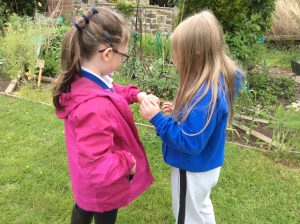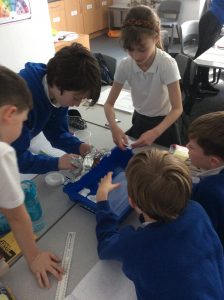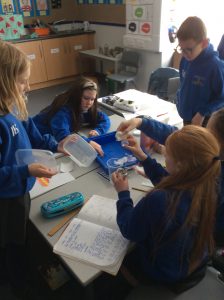Our Science curriculum aims to stimulate and excite a child’s curiosity about the World around them and why things happen in the way they do. Science within our School develops a foundational knowledge, stimulates critical thought and encourages scientific conversation. We aim for children to become confident, passionate and informed scientists who love to share their learning with others.
In Science, the children’s work encompasses the following areas: Biology, Chemistry and Physics, with working scientifically embedded throughout. Units of work are clearly planned to support and encourage children to remember more.

Aims of Science
- To enable learners to ask and answer scientific questions;
- To model and encourage the accurate use of scientific vocabulary;
- To encourage learners to plan and carry out scientific investigations;
- To evaluate evidence and to present conclusions clearly and accurately.
Early Years Aims
In Early Years, children will begin to develop an understanding of the natural world. They will explore the world around them, making observations and drawing pictures of animals and plants. Through stories and images, children will consider similarities and differences between the natural world around them and contrasting environments. Whilst observing the seasons and changing states of matter they will begin to understand some important processes and changes in the natural world around them.
Key Stage 1 Aims
Science teaching in Key Stage 1 is to enable children to experience and observe phenomena, looking more closely at the natural and humanly constructed world around them. They will be encouraged to be curious and ask questions about what they notice. They will be helped to develop their understanding of scientific ideas by using different types of scientific enquiry to answer their own questions, including observing changes over a period of time, noticing patterns, grouping and classifying things, carrying out simple comparative tests, and finding things out using secondary sources of information.
They will be encouraged to use simple scientific language to talk about what they have found out and communicate their ideas to a range of audiences in a variety of ways. Much of the learning about Science will be done through the use of first-hand practical experiences where possible.
Lower Key Stage 2 Aims
Science teaching in lower Key Stage 2 is to enable children to broaden their scientific view of the world around them. They will do this through exploring, talking about, testing and developing ideas about everyday phenomena and the relationships between living things and familiar environments, and by beginning to develop their ideas about functions, relationships and interactions.
They will ask their own questions about what they observe and make some decisions about which types of scientific enquiry are likely to be the best ways of answering them, building on from Key Stage 1.
They will draw simple conclusions and use scientific language to talk about and record what they have found out.
Upper Key Stage 2 Aims
Building upon learning in lower Key Stage 2 pupils will develop a deeper understanding of a wide range of scientific ideas. They will do this through exploring and talking about their ideas; asking their own questions about scientific phenomena; and analysing functions, relationships and interactions more systematically. Children will encounter more abstract ideas and begin to recognise how these ideas help them to understand and predict how the world operates. They will begin to recognise that scientific ideas change and develop over time.
Children will learn to investigate more systematically and will draw conclusions based on their data and observations using evidence to justify their ideas, and scientific knowledge and understanding to explain their findings using appropriate scientific vocabulary.

Supporting Special Educational Needs and Disabilities
All children with SEND will have equal access and opportunities within the curriculum. The School will support these children to ‘catch up’, ‘keep up’ and experience success in the following ways (where appropriate):
- High quality teaching each day through Ordinarily Available Provision (formerly Quality First Teaching);
- Opportunities for pre-learning (particularly new vocabulary) before lessons;
- Appropriately scaffolded or differentiated work or materials;
- Classrooms and materials set up to reduce cognitive load and follow dyslexia friendly strategies;
- Children with SEND have a Pupil Passport which identifies approaches and strategies to be used which will help them to succeed;
- For children with Education, Health and Care Plans there may be 1:1 adult support in lessons.
The School recognises that while a child may have additional needs in one area of the curriculum they may well have skills and talents which allow them to shine and be successful in another and this is to be celebrated.
To view the Science Curriculum Map please Click Here
